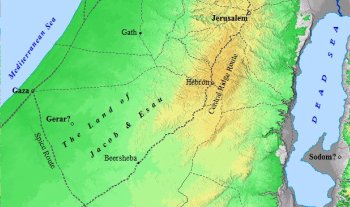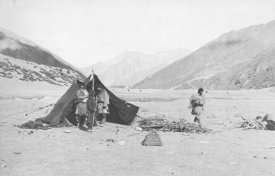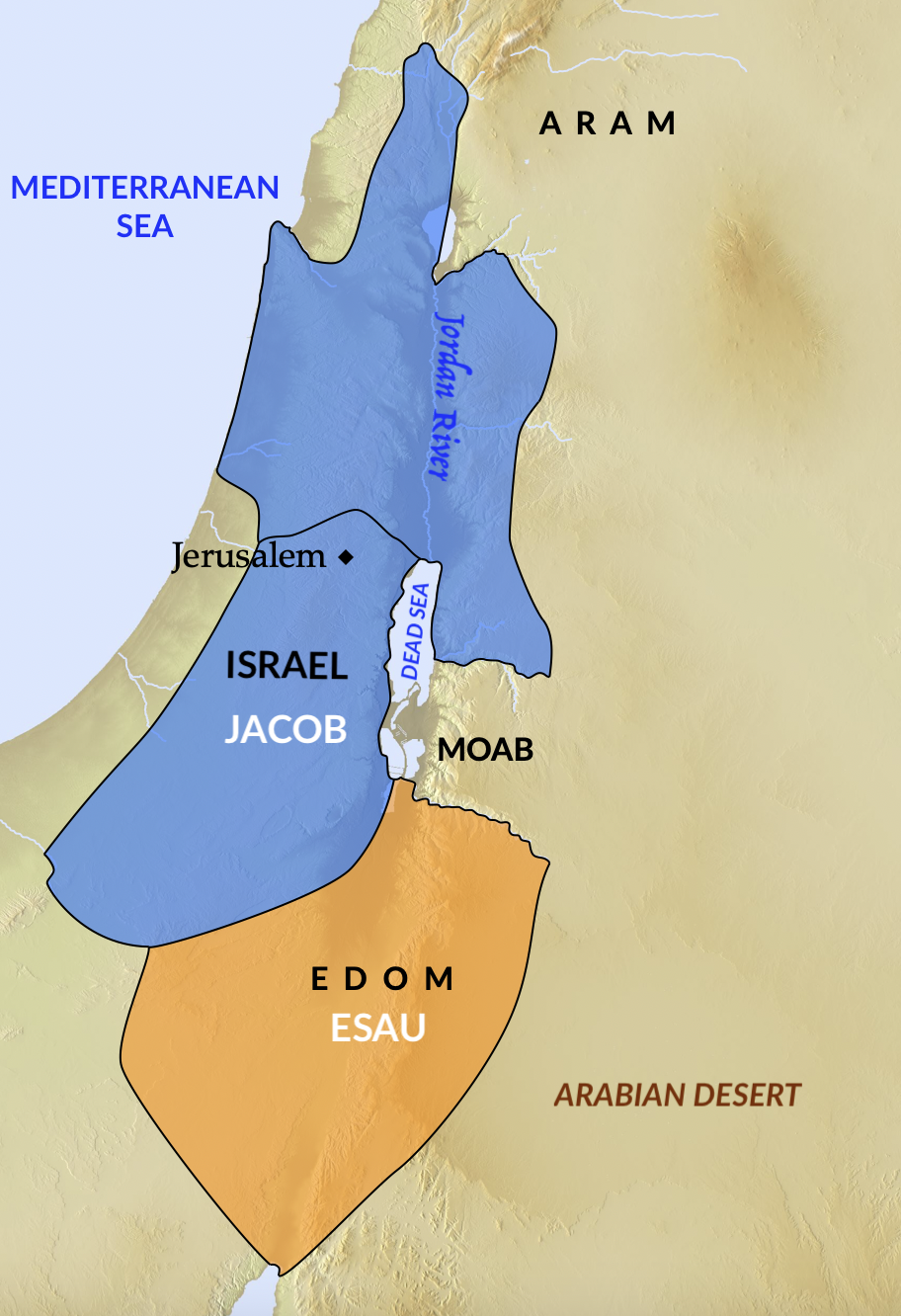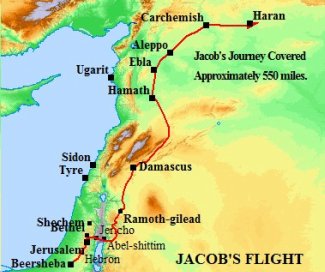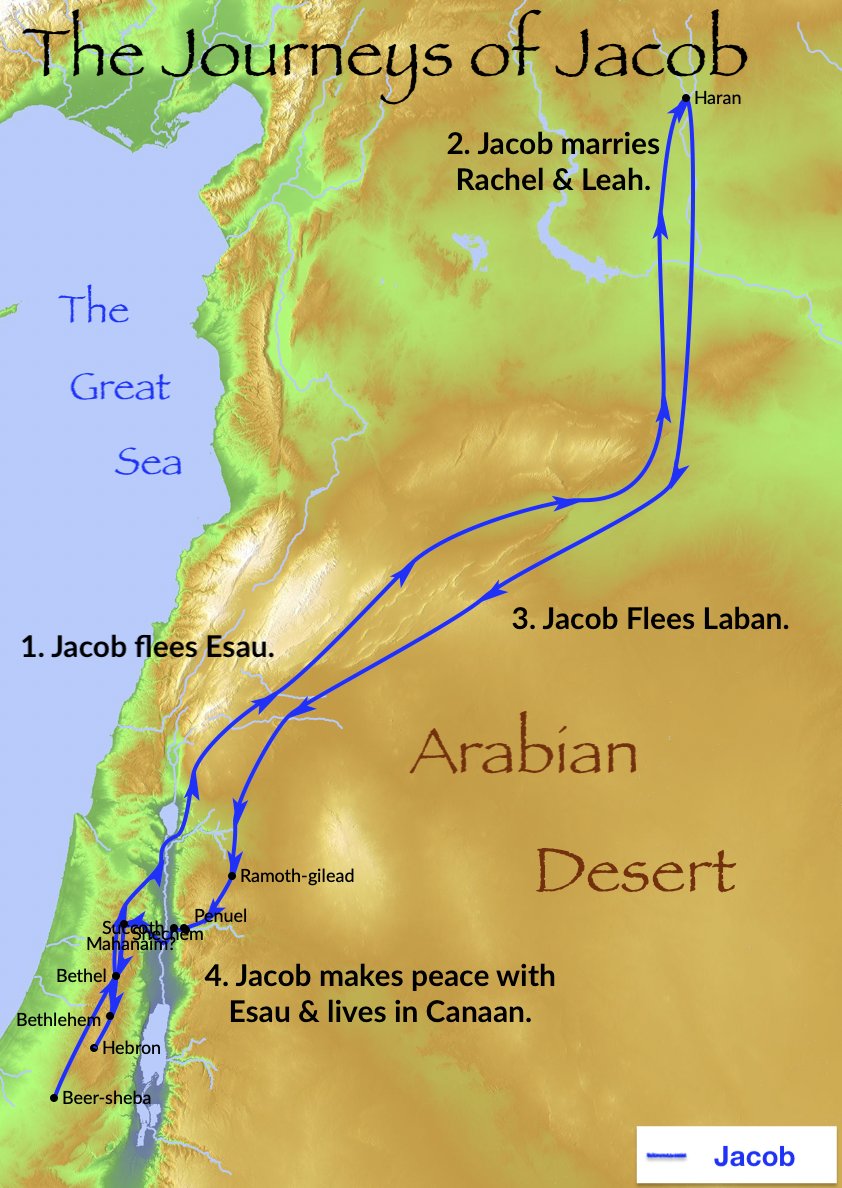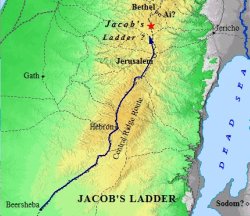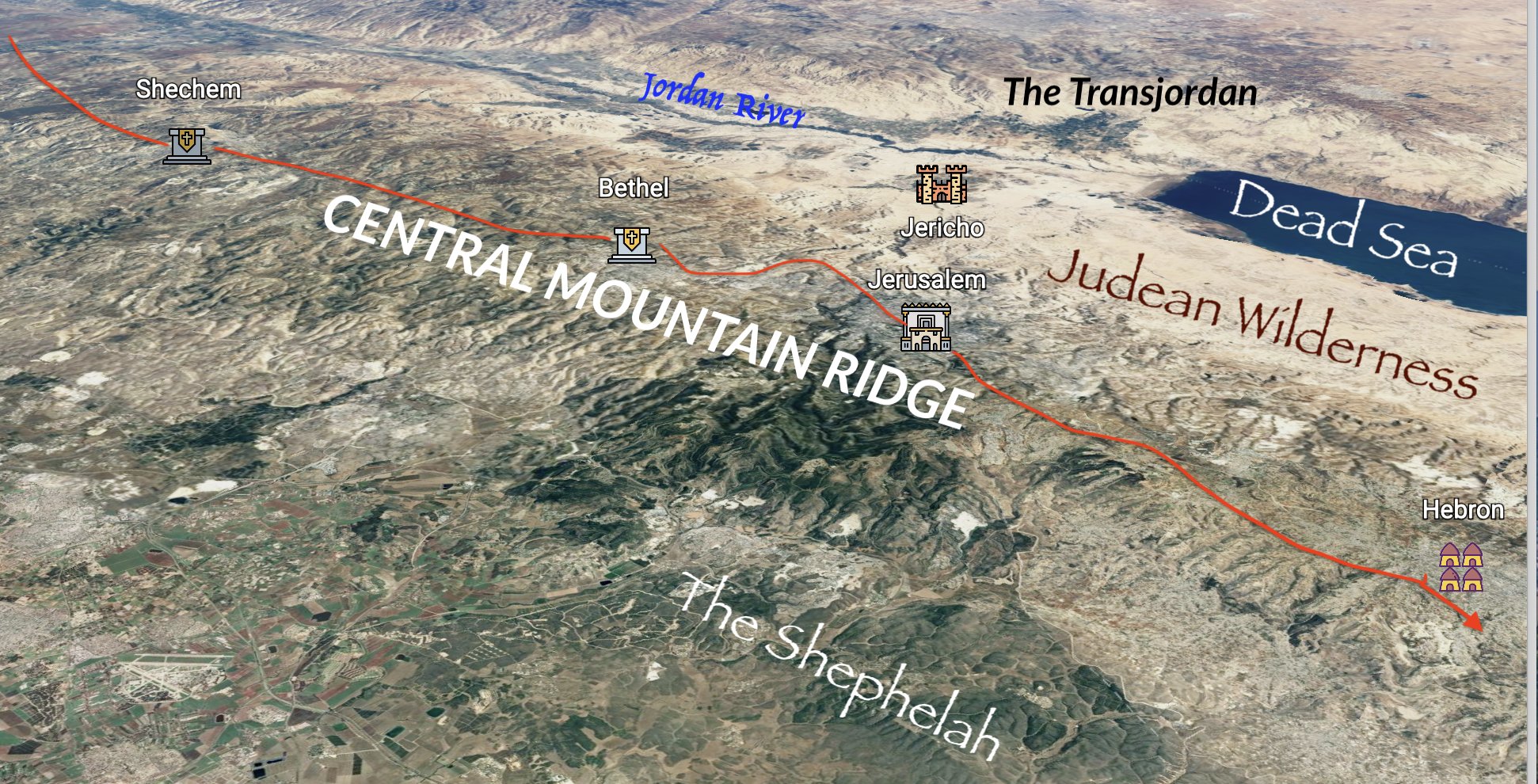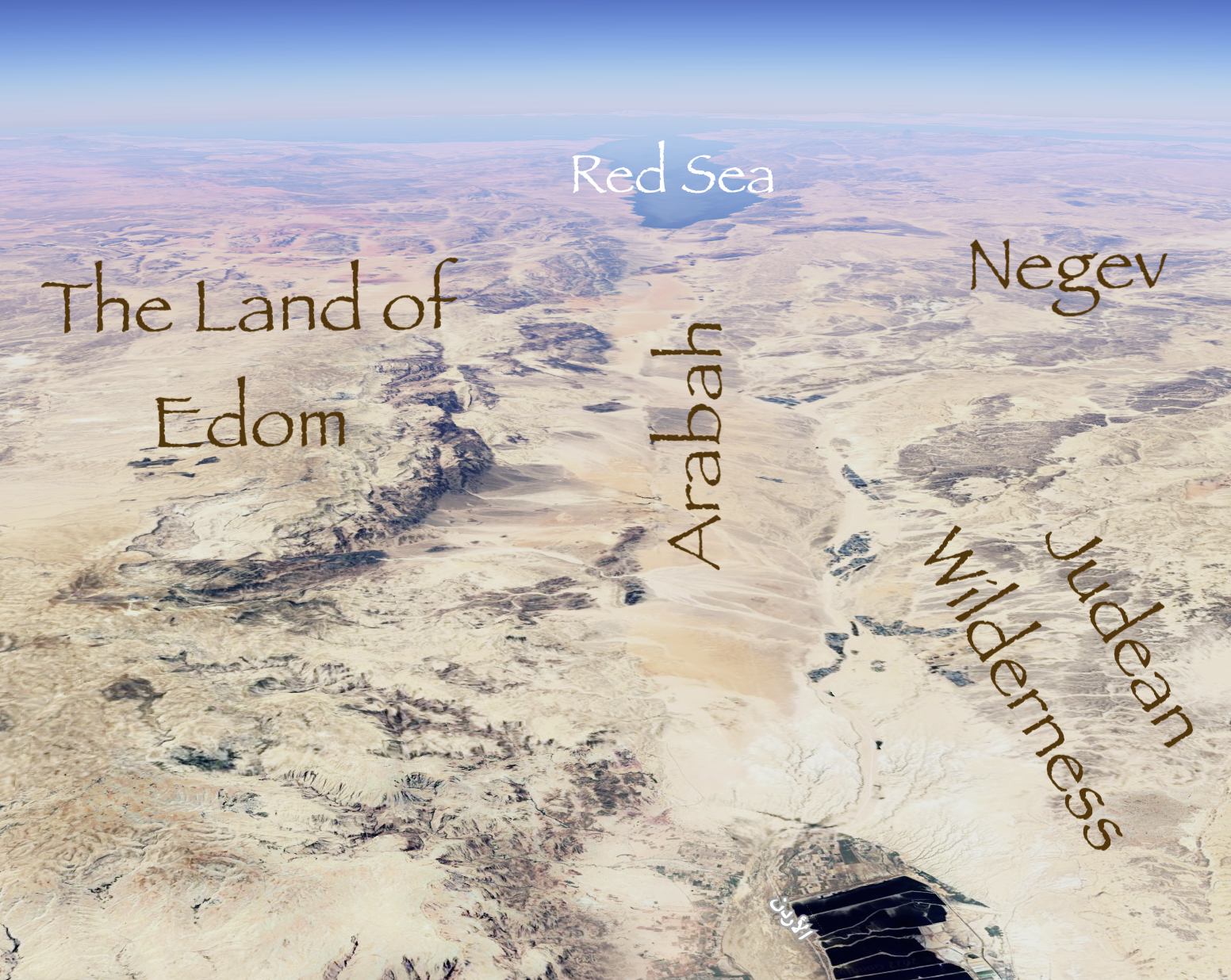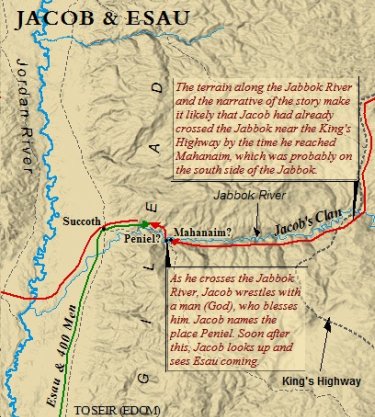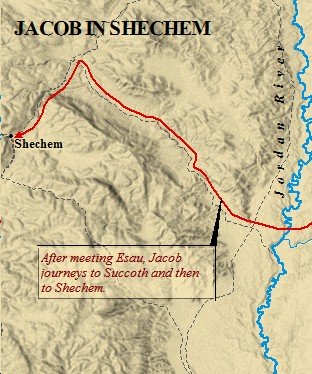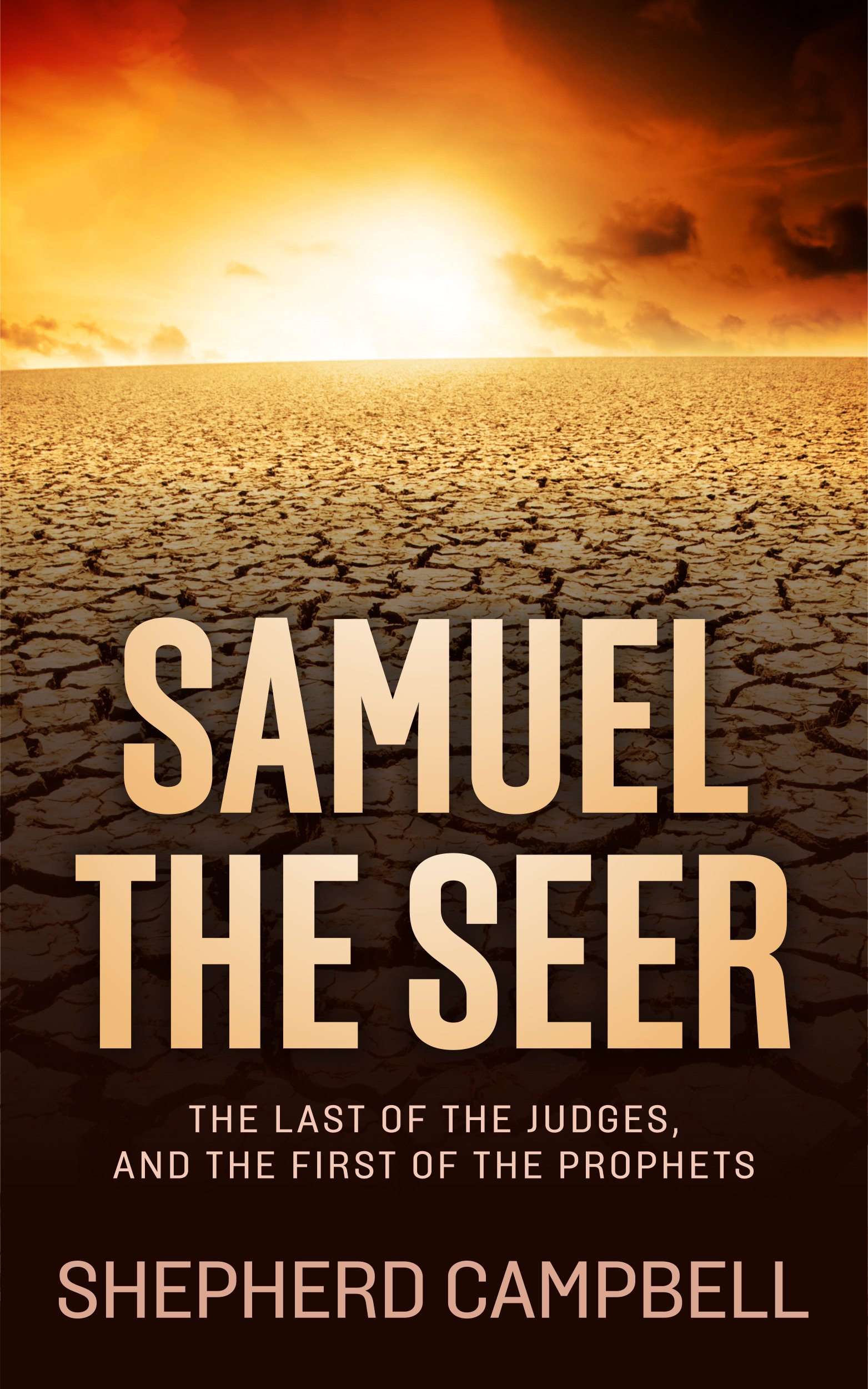- Biblical Maps
- Home Page
- History of Israel Blog
- Ancient Mesopotamia
- Map of Palestine
- Abraham
- Ancient Israel
- 12 Tribes of Israel
- Jerusalem
- The Book of Isaiah
- Palestine
- The Habiru
- Contact Us
- Bible Study Forums
- Media Page
- Visitors Sitemap
- Privacy Policy
- The History of the Old Testament
- In the Days of Noah
- The City of Jericho
VISIT OUR FACEBOOK PAGE!
The Story of Jacob and Esau
The story of Jacob and Esau is believed by many scholars to have happened around the late 19th to early 20th century B.C. Abraham is widely believed to have existed around 2000 B.C., and thus many have placed Jacob and Esau around 1850 B.C. This date, though, is far from agreed upon.
JACOB AND ESAU
One of the unique aspects of the Bible is the way in which it portrays the ancient Hebrews in all of their glory, and in all of their folly & sin. The characters and heroes of the Old Testament are neither infallible, nor above reproach. They are depicted as human and sinful. One such instance can be found in the story of Jacob and Esau.
The narrative concerning Jacob and Esau begins in Genesis 25:20-23. A common theme throughout the early parts of Genesis is the inability of wive's of the Patriarchs to conceive. As was the case with Sarah and Abraham, the same holds true for the parents of Jacob and Esau. Scripture tells us Rebekah, the wife of Isaac, was barren and unable to conceive.
Thus, like his father Abraham, Isaac took their case before the Lord asking for a son.
"And Isaac was forty years old when he took Rebekah to wife, the daughter of Bethuel the Syrian of Padan-aram, the sister of Laban the Syrian. And Isaac entreated the Lord for his wife, because she was barren; and the Lord was entreated of him, and Rebekah his wife conceived. And the children struggled together within her; and she said, If it be so, why am I thus? And she went to inquire of the Lord."
As God did with Abraham, so He did for Isaac. Isaac was 60 years old when his twins were born. This was surely a great test of faith and patience for Isaac and Rebekah.
In answer to their prayers, Rebekah becomes pregnant with twins. God went above and beyond in His answer to their supplications. However, this is to be no normal pregnancy. A problem soon developed inside the womb of Rebekah.
JACOB and ESAU PAGE CONTENTS
Click on a link to view that section of this page.
All Scripture relates is that Jacob and Esau began to struggle (Gen. 25:22) with each other inside the womb. The NIV uses the word "jostled". Whatever this meant, it was clearly more than just normal fetal movement. Rebekah felt it intensely, and became concerned about it. Consequently, she "went to inquire of the Lord".
Verse 23 provides God's response to Rebekah concerning Jacob and Esau.
"And the Lord said unto her, 'Two nations are in thy womb, and two manner of people shall be separated from thy bowels; and the one people shall be stronger than the other people; and the elder shall serve the younger."
Scripture tells us God knows each individual even before they are conceived. In this instance, God foresaw Jacob would end up being more fit to deliver and transmit "the seed of the woman" to the world than Esau would be. Though they were to be twin brothers, Jacob and Esau would possess very different personalities.
THE BIRTH OF JACOB & ESAU
The birth of Jacob and Esau involved a physical struggle between the two newborn baby brothers.
" And when her days to be delivered were fulfilled, behold, there were twins in her womb. And the first came out red, all over like a hairy garment; and they called his name Esau. And after that came his brother out, and his hand took hold on Esau's heel; and his name was called Jacob; and Isaac was threescore years old when she bare them."
The struggle which had begun inside the womb, was carried outside as Jacob and Esau were born. This would foreshadow the struggle which would consume much of their lives. This struggle would also manifest itself in the respective countries of Jacob and Esau; Israel and Edom.
The name of each son was indicative of their characteristics. Esau means "red". Esau apparently was a hairy man, and his hair was red. Jacob means "heel grabber". Some scholars have said this implies "supplanter", or, "schemer", of which Jacob surely becomes. The prophet Hosea had this to say about the birth of Jacob.
Hosea 12:3
"In the womb he grasped his brother's heel; as a man he struggled with God."
Jacob and Esau were very different from the moment of their birth. Rebekah had already received the prophecy from God that the youngest would rule over the eldest. Scripture does not specify, but it seems logical she would have reported this to Isaac.
As the younger Jacob emerged with a grip on Esau's heel, Rebekah and Isaac surely would have been reminded of God's prophecy. The struggle between Jacob and Esau had begun, and would eventually divide the family.
THE BIRTHRIGHT
The Bible tells us Jacob and Esau grew up very different. Esau is said to have been a "cunning hunter, a man of the field". Whereas, Jacob was said to have been a "plain man, dwelling in tents". Scripture paints a picture of complete opposite personalities, motivations, pursuits, and interests.
ESAU
Esau was an outdoorsman. He lived for the hunt, and enjoyed his game by eating the meat. We are told Isaac loved Esau more than Jacob "because he did eat of his venison".
This becomes important as the narrative continues, because it seems to imply Isaac let his appetite get in the way of God's plan. Even though God had prophecied Jacob would rule, Isaac continued to favor Esau, chiefly because of his venison.
Esau was rugged, hairy, a man's man. He was also a fornicator and profane, according to Hebrews 12:16.
"See that no one is sexually immoral, or is godless like Esau, who for a single meal sold his inheritance rights as the oldest son.".
Esau would further distance himself from God's commands by marrying two Canaanite women, described in Genesis 26:34-35.
"And when Esau was forty years old he married Judith the daughter of Beerie the Hittite, and Basemath the daughter of Elon the Hittite; and they brought grief to Isaac and Rebekah."
Rebekah further uses this as an excuse to send Jacob away to find a wife from among their own people, as God had ordered Abraham to do. Scripture explicitly states Esau's wives "brought grief" to Isaac and Rebekah. This grief was more than likely twofold; grief over Esau taking from the daughters of Canaan, and grief over the fact these Canaanite women were, in all probability, idolaters. Their influence on Esau would not be good.
JACOB
The fundamental difference in the character of Jacob and Esau can be seen in Jacob's description as a "plain" man. The King James Version calls Jacob a "plain man". The NIV calls him a "quiet man". The NASB calls him a "peaceful" man.
The actual Hebrew word used in this verse is "Tam". This word was used by God Himself to describe Job's character to Satan in Job 1:8.
"Then the Lord said to Satan, 'Have you considered my servant Job? There is no one on earth like him; he is blameless and upright, a man who fears God and shuns evil."
The King James translates Job 1:8 as "perfect". Taken in context with this verse, Jacob was much more than a plain, quiet, or even peaceful man. He was a man of God, "blameless and upright". Rebekah favored the reflective and spiritual Jacob. Between Jacob and Esau, Scripture clearly indicates Jacob was more concerned with the affairs of God than was Esau.
As Jacob tended the flocks and dwelt amongst the tents, he was likely to have learned to cook, as Esau had with venison. Jacob is doing just that in Genesis 25:29. Esau runs in "from the field", as Jacob is preparing a pot of stew.
A logical assumption is Esau's hunt was unsuccessful, and Scripture says he was "famished", or weary. He asked Jacob for a bit of his stew. Jacob agrees, though only in exchange for Esau's birthright. Esau's flippant answer illuminates his mind set.
"Behold, I am about to die; so of what use then is the birthright to me?"
Details are not given as to Esau's condition, yet, the implication is he was "weary", perhaps faint from hunger. Esau either appears rather impulsive, or, he was near starvation. Or, perhaps he below off Jacob's proposition as ridiculous and he had no intention of honoring it. Whatever Esau's condition or mindset, Jacob forces Esau to swear the birthright to him in exchange for food. Scripture casually relates Esau "ate and drank, and rose and went on his way".
REBEKAH'S PLOT
The next passage in Scripture dealing with Jacob and Esau begins in Genesis 27. An agin Issac has lost much of his vision. He called his eldest and favorite son to him with one last request. Isaac tells Esau to go to the field, kill some game for Jacob, and prepare it to eat. After the meal, he would bless Esau with the appropriate blessing of the eldest son.
Rebekah overheard the conversation and immediately sent for her favorite son, Jacob. Time was running out if she were going to secure Jacob's position. She had to act quickly, and what unfolds next is reminiscent of a modern day soap opera.
While Esau is out in the field hunting, Jacob and Rebekah are busy preparing some game, apparently from the nearby flocks and herds. Rebekah prepares the venison as Isaac likes it. However, one problem existed which they had to overcome in order to successfully execute their strategy.
Jacob and Esau possessed different bodies. Esau was a hairy man, referenced frequently throughout Scripture. Jacob, however, was not. In order to deceive Isaac, Jacob and Rebekah would have to simulate Esau's hairiness.
Rebekah dressed Jacob in Esau's clothes, to simulate his smell. She then took the "skins of the kids", or goats, and put them on Jacob's skin and the smooth parts of his neck in order to replicate the hairy and coarse skin of Esau. Only once these preparations are complete does Jacob take the prepared meal into his father.
Isaac sensed something was not right at the sound of Jacob's voice. He ushered Jacob forward, grabbing his hands and feeling for the thick hair of his eldest son Esau.
"The voice is the voice of Jacob, but the hands are the hands of Esau." (Gen. 27:22)
Isaac sensed something was not quite right, but, the preparations taken by Rebekah and Jacob to deceive Isaac worked. Isaac blesses Jacob in Genesis 27:27-29, and thus the deception is complete. Esau arrives back "as soon as Isaac had finished blessing Jacob". When Esau approached his father Isaac suddenly realized what had happened.
Upon this sudden and shocking revelation Isaac is said to have "trembled very exceedingly". Henry Morris points out Hebrew scholars have translated this phrase as; "Isaac trembled most excessively with a great trembling".
The image is vivid. Isaac can offer nothing to Esau but a blessing which may be better characterized as a curse (Gen. 27:39-40). Esau becomes enraged and swears to kill Jacob once Isaac dies (Gen. 27:41). The struggle between Jacob and Esau had escalated into a life and death situation.
History has judged Jacob the guilty party. He was the manipulator and schemer. He was the liar. At first glance these sentiments seem accurate and true. He did deceive his father. He did steal from his brother. Those are the facts of the story and cannot be denied.
|
JACOB FLED NORTHWARD TO MESOPOTAMIA AFTER ESAU DISCOVERED THE DECEPTION. |
However, one should keep in mind that Jacob is never accused by God one time throughout all of the narrative. God had, after all, confirmed to Rebekah Jacob would be the promised son. It was Isaac's job, as head of the Beth-ab, to see to God's will being done. He had failed to transmit God's wishes to his children regarding the birthright. Jacob and Rebekah thus felt impelled to take matters into their own hands. Perhaps, Jacob's sin lie in he was not faithful to allow God to work. |
Study Resource
Bert Dicou focuses on the theme of Edom in the Old Testament in his book Edom, Israel's Brother And Antagonist . Four long oracles are found in the Old Testament concerning Edom, the descendants of Esau, brother of Jacob. Edom became one of Israel's most bitter enemies, constantly at odds with the Israelites from whom they were related. Dicou brings to life the role of Edom in the Old Testament, and the origin and evolution of Edom's exceptional role! Click on the link below to visit Barnesandnoble.com and learn about Edom, Israel's Brother And Antagonist!
Edom, Israel's Brother and AntagonistJACOB'S FLIGHT
Rebekah hears of Esau's curse through an unnamed source. Interestingly, her initial plan called for Jacob fleeing to her brother Laban for only a "few days, until your brother's fury subsides". Little did they both know it would be a twenty year stay.
She urged Isaac to send Jacob away to find a wife among their people, as Abraham had done for him. She complained once more of Esau's wives, perhaps to lessen Jacob's guilt. Isaac blesses Jacob, and sends him on his way.
"Then Isaac sent Jacob away, and he went to Paddan-aram to Laban, son of Bethuel the Aramean, the brother of Rebekah, the mother of Jacob and Esau.".
Interestingly, Aramean blood ran strong in Jacob and Esau. The Hebrews and Arameans shared many close characteristics, including similarity of language. Jacob was called a "wandering Aramean" in Deuteronomy 26:5. The ties between these two people, as well as those in ancient Mesopotamia, are made clear throughout Scripture.
The current conflict should take notice of their extremely close
ancestral ties. Common ground is not as far away as people may think.
At the time of this incident, Isaac and family were living in Beer-sheba. As Jacob left his family behind Scripture records he "set out for Haran". From Beersheba the logical route would have led him northward, towards Jerusalem . The route would have been well known by the Patriarchal family by this time.
Quite possibly Jacob proceeded northward along the Central Ridge Route. Scripture is vague about the specifics regarding his journey. Jacob left in a hurry, to flee his brother Esau. Jacob and Esau would not see each other for a very long time.
Jacob's vision is described in Genesis 28:12.
"He had a dream in which he saw a stairway resting on the earth, with its top reaching to heaven and the angels of God were ascending and descending on it."
At the top of the stairway stood God. He then gives Jacob the same promise He had given to both his father, Isaac, and his grandfather, Abraham (28:13-15).
The Hebrew word from which "ladder" has been translated is "Sullam". Though this is the only occurrence of the word in the Bible, the corresponding verb, "salal", means "to heap up".
The implication is somewhat akin to steps, or a ramp of somekind. Perhaps a more accurate image is that of the Babylonian stepped ziggurats. These temples would have been well known to the Babylonian Jewish writers of the Exile period.
Regardless of the form of Jacob's dream, upon awakening, he immediately recognizes the place as holy, and names it Bethel, which translates as "House of God". He commemorates the dream by erecting a stone pillar, similar to the ancient Stele (click to view Israel Stele).
Many scholars argue this spot was the very same spot Abraham had offered up Isaac, and would eventually become the sacred spot of the Temple built by Solomon. Scripture indicates Jacob renamed the city Bethel, "thought the city used to be called Luz."
The actual city of Bethel is 11 miles north of Jerusalem. It sat astride the Central Mountain ridge in Canaan. If Jacob took the route to cross the Jordan River most scholars propose, then Jacob and his party would have crossed the Jordan south of Bethel passing through Jericho. From Jericho he would have continued west to Jerusalem. The route to Heshbon from Jericho would have connected Jacob to The Kings Highway, running north to south on the east side of the Jordan River.
Thus, it would not seem logical for Jacob to have traveled 11 miles north, only to backtrack. This may strengthen the argument of those that feel his vision took place on what would become the Temple Mount. Indeed, many of Scripture's holiest encounters have taken place on this mountain.
The journey to Haran would have taken close to 560 miles. Moving
at an average of 15 miles a day, the speed at which scholars estimate
ancient travel, the journey would have taken over 37 days. The paths of
Jacob and Esau had diverged significantly. Jacob had left Canaan
altogether. Meanwhile, Esau was busy with his own life in the land of Canaan.
ESAU
After Jacob had left, Esau takes notice of his brother's obedience (Gen. 28:6-7). Scripture reveals Esau came to the realization how "displeasing the Canaanite women were to his father Isaac". In an attempt to rectify matters somewhat, he married Mahalath, "sister to Nebaioth and daughter of Ishmael son of Abraham."
Esau sought to gain favor by marrying within the family, something he should have done in the first place. He migrates to the red Nubian sandstone region southeast of Beersheba and laid down roots. Esau would establish his kingdom in this region southeast of the Dead Sea
This mountainous region was known as Edom, indicative of the red colored sandstone which dominated the region. Scripture also refers to this area as Seir in Genesis 32:3 The Nabateans would later carve out the rock city of Petra from the Nubian sandstone.
Esau and his descendants became known as the Edomites, and built their cities in the rugged mountains overlooking the Arabah. Teman and Bozrah were strong mountain fortresses, which overlooked and threatened to control routes through the Arabah.
Edom became a fierce enemy of Israel. Their control of the mountainous region threatened Judah's control over the Arabah, and the routes which led to Solomon's port city, Ezion-geber. David would later conquer Edom, and station troops in the land. The Edomites received damning curses for their role in Nebuchadnezzar's destruction of Jerusalem.
Obadiah 10-14
"Your warriors, O Teman, will be terrified, and everyone in Esau's mountains will be cut down in the slaughter."
The Bible makes it evident the descendants of Jacob and Esau were to suffer very different fates. Jacob fled to Haran, where he stayed with Laban for the next twenty years. It was in Haran eleven of Jacob's sons were born. Laban manipulated and deceived Jacob into working for him for 14 years, in exchange for his daughters Rachel and Leah.
Laban's first deception involved tricking Jacob into marrying Leah, when Jacob thought he was marrying Rachel. Scripture later indicates Laban also changed Jacob's wages ten times.
It would be another six years before Jacob would leave Laban suddenly, and without warning. Jacob had become so prosperous, Laban and his sons had become suspicious. Scripture indicates Jacob felt threatened by Laban's change of nature. God came to Jacob in Genesis 31:3 , and urged him to depart at once; "to the land of your fathers, and to your relatives, and I will be with you."
Before Jacob and Esau were to reunite, Jacob had to thwart off Laban. Laban and his sons had pursued Jacob, and caught up with him in the hill country of Gilead. After a warning from God, Laban sought a peace treaty with Jacob. The two consummated their agreement in Mizpah-Gilead.
It was now time to face his brother. A new chapter in the life of Jacob and Esau was about to begin. The story of the reunion between Jacob and Esau takes place in Genesis 32.
JACOB AND ESAU REUNITE
Chapter 32 opens up with Jacob and Laban going their separate ways, at peace with each other after their pact. As Jacob moves his camp closer towards Canaan, Scripture reports "the angels of God met him". God obviously felt the need to further strengthen and encourage His faithful servant.
Jacob claims the place as "the camp of God", and names it Manaheim, which translates as such. From there, he sent messengers ahead to Esau. Jacob and Esau had not seen each other in twenty years. Jacob wanted to entreat Esau with messages of peace and offerings of gifts to soften the anger Esau surely felt.
The messengers seem to have met Esau on the road. Scripture implies Esau had heard of Jacob's return, and had moved out northward from Edom. They report back quickly to Jacob, and inform him Esau is coming to meet him with four hundred men.
This is a testament to the wealth and might of Esau. He had
prospered greatly as well during their separation. Jacob responded in
verse 7 with "great fear and distress".
In an attempt to spare the lives of his household, he divides the camp into two groups. He then selects 580 animals, consisting of goats, sheep, cattle, camels, and asses. He divides these into five waves, and spaces each drove out at different intervals.
The intent is to flood Esau with gifts, in different stages, as he approaches Esau. Jacob shows his cleverness again in this tactic. He hopes to lessen the blunt of Esau's wrath, and hopefully turn Esau from murderous intent.
After Jacob separates the animals for Esau, he takes his two camps and crosses the Jabbok River. It is likely Jacob would have approached the river from the north, thus, he took his family across to the southern banks of the Jabbok. The exact details are not given.
Scripture seems to imply Jacob then crossed back to the other side of the river, where he spent the night alone in prayer. It was in this spot which Jacob would receive his new name.
Genesis 32:24-32
"And Jacob was left alone; and there wrestled a man with him until the breaking of the day. And when he saw that he prevailed not against him, he touched the hollow of his thigh; and the hollow of Jacob's thigh was out of joint, as he wrestled with him. And he said, Let me go, for the day breaketh. And he said, I will not let thee go, except thou bless me. And he said unto him, What is thy name? And he said, Jacob. And he said, 'Thy name shall be called no more Jacob, but Israel; for as a prince hast thou power with God and with men, and hast prevailed."
Israel was the new name of Jacob, and was to be the name of his descendants until the end of time. The name Israel is a combination of two words; Yisra, which means "persevere with God", and the divine name "El". Yisrael became translated Israel, from which the term Israelite came to represent members within the 12 tribes of Israel.
God had allowed Jacob/Israel to prevail in their struggle no doubt to boost his confidence. Jacob and Esau were to face each other the next day. To commemorate the experience, Jacob named the place Peniel, or, Penuel. This translates as "The Face of God".
Jacob had little time to celebrate the occasion, as the very next verse indicates "Jacob looked up and their was Esau, coming with his four hundred men". Jacob immediately set his camp behind him, as he would be the first to encounter Esau.
Jacob set the maidservants and their children in the front, Leah and her children next, and Rachel and Joseph in the rear. Jacob then went on ahead, bowing down seven times before the feet of Esau.
"But Esau ran to meet Jacob and embraced him; he threw his arms around his neck and kissed him. And they wept.".
After twenty years of separation, Jacob and Esau embraced, setting aside all their past difficulties, grudges, jealousies, and misdeeds. The two brothers were united under the loving embrace and supervision of the God of their fathers. As Ishmael and Isaac had made amends, so Jacob and Esau had as well.
Jacob's household then presents themselves to Esau, overcome with the prosperity of his younger brother. Esau then questions as to the gifts Jacob had sent, and urged him to take them back.
"I already have plenty, my brother. Keep what you have for yourself."
Jacob urgently requested Esau to accept the gifts, which Esau reluctantly does. Jacob and Esau had come full circle, and the Lord had seen to every step of the journey. After what was sure to have been a long talk, full of laughs and tears, the two brothers parted company once again. This time, though, the time between meetings would be much less.
Scripture indicates Esau headed back to Seir, or Edom. Jacob continues westward, towards Canaan. Just east of the Jordan River Jacob halted his clan. Scripture describes him as building a place for himself, and shelters for his livestock. Accordingly, he named the place Succoth, which translates as "Shelters".
He stayed here for an unspecified amount of time. The contextual evidence seems to suggest it was not a very long time. Verse 18 describes how Jacob crossed the Jordan, and camped within eyesight of the city of Shechem. Perhaps Jacob encamped near the very same spot his grandfather Abraham had decades earlier, upon his arrival into Canaan.
The story of Jacob and Esau closes with Jacob purchasing a field near Shechem from the sons of Hamor. What had began as a struggle out of the womb, had culminated in Jacob and Esau making amends decades later. The narrative comes to a close in Genesis 35:27-29.
"Jacob came home to his father Isaac in Mamre, near Kiriath Arba, where Abraham and Isaac had stayed. Isaaac lived a hundred and eighty years. Then he breathed his last and died and was gathered to his people, old and full of years. And his sons Esau and Jacob buried him."
The story of Jacob and Esau remains one of the most beloved
stories of the Old Testament. Through the triumphs and shortcomings of
these twin brothers, God demonstrated His faithfulness, and bestowed His
blessing on both Jacob and Esau. Their descendants, however, would not
remain as close. Israel and Edom were to square off many times over the
following centuries, with David eventually conquering them. The Edomites
eventually faded into history, meanwhile, the Israelites continue to
make history.
Back to the Top of Jacob and Esau
Back to the 12 Tribes of Israel
Back to the Home Page
SAMUEL the SEER
Now Available in Print & eBook on Amazon!!
POPULAR TOPICS
Learn more about these popular topics below. The Bible is full of fascinating stories, characters and mysteries!
BIBLE MAPS
Explore the land of the Old Testament! View these maps of the Bible.
